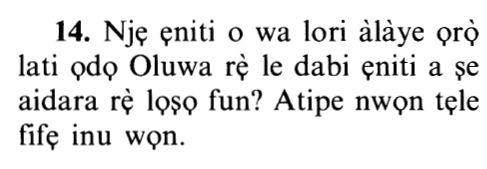47vs14
Select any filter and click on Go! to see results
أَفَمَن كَانَ عَلَى بَيِّنَةٍ مِّن رَّبِّهِ كَمَن زُيِّنَ لَهُ سُوءُ عَمَلِهِ وَاتَّبَعُوا أَهْوَاءهُمْ
Afaman kana AAala bayyinatin min rabbihi kaman zuyyina lahu sooo AAamalihi waittabaAAoo ahwaahum
Index Terms
Click to play
Yoruba Translation

Hausa Translation
Shin, wanda ya kasance a kan wata hujja daga Ubangijinsa, zai zama kamar wanda aka ƙawãce masa mugun aikinsa, kuma suka bibbiyi son zũciyõyinsu?
Asbabu n-Nuzuul (Occasions of Revelation)
The Worshipper of the Truth and the Worshipper of Lust are not Equal
Allah says:
أَفَمَن كَانَ عَلَى بَيِّنَةٍ مِّن رَّبِّهِ ...
Can then he, who stands on clear evidence from his Lord...
This means a person who is upon clear vision and certainty concerning Allah's commands and His religion, because of the guidance and knowledge that Allah has revealed in His Book, and because of the pure nature upon which Allah has created him.
... كَمَن زُيِّنَ لَهُ سُوءُ عَمَلِهِ وَاتَّبَعُوا أَهْوَاءهُمْ ﴿١٤﴾
(Can he) be likened to those for whom their evil deeds are beautified for them, while they follow their own lusts?
which means that they cannot be equal.
This is similar to Allah's saying,
أَفَمَن يَعْلَمُ أَنَّمَآ أُنزِلَ إِلَيْكَ مِن رَبِّكَ الْحَقُّ كَمَنْ هُوَ أَعْمَى
Can he who knows that what has been revealed unto you from your Lord is the truth be like him who is blind? (13:19)
And,
لاَ يَسْتَوِى أَصْحَـبُ النَّارِ وَأَصْحَـبُ الْجَنَّةِ أَصْحَـبُ الْجَنَّةِ هُمُ الْفَآئِزُونَ
Not equal are the people of the Fire and the people of Paradise. The People of Paradise will be the successful ones. (59:20)
" أفمن كان على بينة من ربه " أي على بصيرة ويقين في أمر الله ودينه بما أنزل الله في كتابه من الهدى والعلم وبما جبله الله عليه من الفطرة المستقيمة " كمن زين له سوء عمله واتبعوا أهواءهم " أي ليس هذا كهذا كقوله تعالى " أفمن يعلم أنما أنزل إليك من ربك الحق كمن هو أعمى " وكقوله تعالى" لا يستوي أصحاب النار وأصحاب الجنة أصحاب الجنة هم الفائزون " .
"أفمن كان على بينة" حجة وبرهان "من ربه" وهم المؤمنون "كمن زين له سوء عمله" فرآه حسنا وهم كفار مكة "واتبعوا أهواءهم" في عبادة الأوثان أي لا مماثلة بينهما
الألف ألف تقرير . ومعنى " على بينة " أي على ثبات ويقين , قاله ابن عباس . أبو العالية : وهو محمد صلى الله عليه وسلم . والبينة : الوحي .
I'raab - grammatical analysis of the Qur'an
«أَ فَمَنْ» الهمزة حرف استفهام والفاء حرف استئناف ومن مبتدأ.
«كانَ» ماض ناقص اسمه مستتر.
«عَلى بَيِّنَةٍ» جار ومجرور خبر كان والجملة الفعلية صلة والجملة الاسمية مستأنفة.
«مِنْ رَبِّهِ» متعلقان بمحذوف صفة بينة.
«كَمَنْ» خبر المبتدأ من.
«زُيِّنَ» ماض مبني للمجهول.
«لَهُ» متعلقان بالفعل.
«سُوءُ» نائب فاعل.
«عَمَلِهِ» مضاف إليه والجملة الفعلية صلة من.
«وَ اتَّبَعُوا» ماض وفاعله.
«أَهْواءَهُمْ» مفعوله والجملة معطوفة على ما قبلها.
